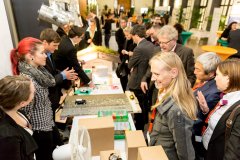
The UNESCO-UNEVOC International Centre: Who We Are | What We Do | Working With Us | Get in Touch
The UNEVOC Network: Learn About the Network | UNEVOC Network Directory
For Members: UNEVOC Centre Dashboard
Thematic Areas: Inclusion and Youth | Digital Transformation | Private Sector Engagement | SDGs and Greening TVET
Our Key Programmes & Projects: BILT: Bridging Innovation and Learning in TVET | Building TVET resilience | TVET Leadership Programme | WYSD: World Youth Skills Day
Past Activities: COVID-19 response | i-hubs project | TVET Global Forums | Virtual Conferences | YEM Knowledge Portal
Our Services & Resources: Publications | TVET Forum | TVET Country Profiles | TVETipedia Glossary | Innovative and Promising Practices | Toolkits for TVET Providers | Entrepreneurial Learning Guide
Events: Major TVET Events | UNEVOC Network News
 More and more people live in urban areas. Cities have to find solutions to challenges such as rising traffic and increasing waste, and they must address climate change by developing concepts for sustainable living and growth, for example by improving the energy efficiency of housing. Green jobs and skills play a key role in the development of a green economy and green urban societies.
More and more people live in urban areas. Cities have to find solutions to challenges such as rising traffic and increasing waste, and they must address climate change by developing concepts for sustainable living and growth, for example by improving the energy efficiency of housing. Green jobs and skills play a key role in the development of a green economy and green urban societies.
From 25 to 26 November 2014, the City of Magdeburg organized a conference on “Green Cities – Green Industries” in close cooperation with GIZ, whose Magdeburg office, together with Magdeburg University and the Fraunhofer Institute for Factory Operation and Automation, is a member of the UNEVOC Network dedicated for advancing sustainability in TVET.
The conference was attended by several private companies such as Mercedes Benz, Brandt and Wengler, and representatives of Magdeburg’s network of city partners, which includes Ankara (Turkey), Pathum Thani and Bangkok (Thailand), Taipei and Harbin (China), Saporoshje (Ukraine), La Pobla de Vallbona (Spain), Tübingen (Germany), Warsaw (Poland) and Wiener Neustadt (Austria). The aim was to promote the exchange of experiences and to strengthen a network of city partnerships committed to green and sustainable growth. City partners also signed the
Magdeburg Protocol![]() that states the member cities' joint intentions and recommended actions for green and smart cities.
that states the member cities' joint intentions and recommended actions for green and smart cities.
UNESCO-UNEVOC’s Green TVET expert on loan from BIBB, Ms Dagmar Winzier, joined the conference and held a presentation on “Green skills for green jobs in urban areas – Promising practices from the international perspective”. She gave good-practice examples and innovations for skills that promote environmentally-conscious urban development.
Discussions considered the following question, and recommendations were made in these areas:
Photo: Andreas Lander